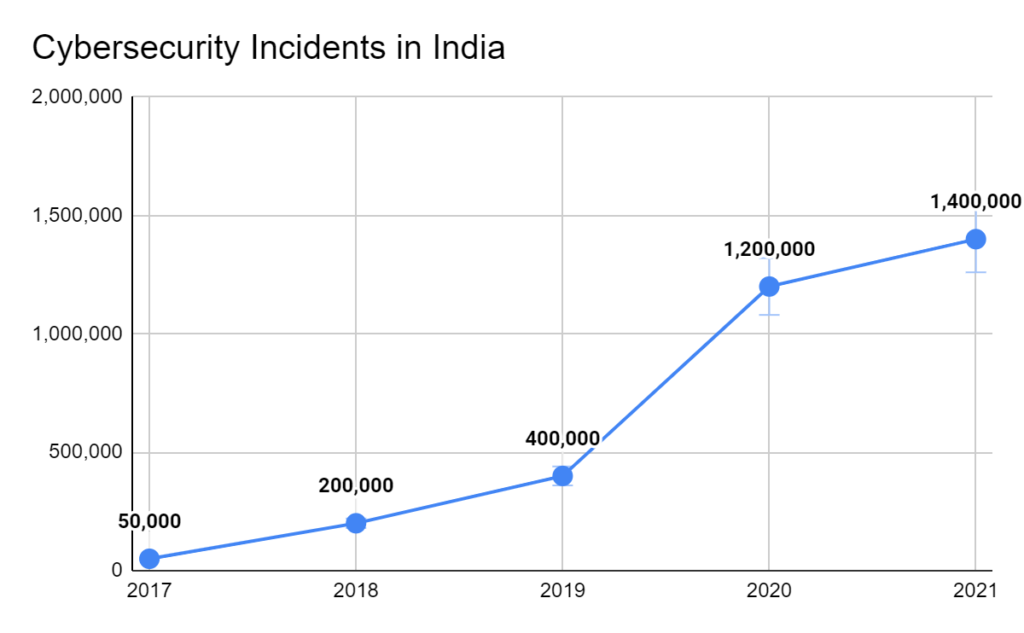Ranking 4th among APAC countries and Top 10 In Global Cybersecurity Index 2020 Rankings, India has been immensely vocal about its cybersecurity ambitions. The country has been working relentlessly to address the cybersecurity threat. As per government data, 16 lakh cybercrime incidents have been reported and more than 32,000 FIRs have been registered since 2020. there. Despite the start of the digital era, India’s cybersecurity threats had their worst year in 2022. Over 829 million cyber-attacks were blocked in Q4 2022, a majority of 59 percent of the attacks were on websites in India.

The cybersecurity industry will see an increase in investments in technologies and services due to increased interest. The business sector has contributed significantly to resolving cybersecurity challenges in India in addition to these government-led programs. Cybersecurity practices have been formed by businesses like Tata Consultancy Services, Wipro, and HCL Technologies to offer services including threat intelligence, incident response, and penetration testing.
The safeguarding of vital infrastructure has been one of the Indian government’s top priorities. Guidelines for safeguarding key information infrastructure, which covers industries like power, banking, and telecom, have been released by the Indian Ministry of Home Affairs. Concerns including risk management, incident management, and catastrophe recovery are the main topics of the recommendations.
Government Initiatives:
In 2022, the government published a list of steps it has taken to avoid cyberattacks on a national level. To strengthen India’s cyber security posture and safeguard the nation’s cyberspace, the Indian government unveiled a national cyber security policy back in 2019. A national cyber coordination center is established as part of the strategy, and essential information infrastructure sectors including telecom, banking, and finance have sector-specific regulations created.
Businesses and cybersecurity:
The cyber security environment is rapidly changing as hackers seek new ways to attack new IT practices and shift workplace standards. Enterprises are doing everything they can to keep their operations secure. The majority of India’s cybersecurity infrastructure is controlled by a few significant corporate entities and government defense organizations. The lack of a unified national cybersecurity critical infrastructure impedes much of how businesses prepare for such occurrences.
Business Interruption Loss
Unlike in the past when business interruption happened in the form of natural mishaps, employee strikes, etc., cyberattacks constituting ransomware, malware, phishing, and denial of service attacks are common throughout sectors and businesses, with finance/insurance, manufacturing, energy, retail, and health care. The number of ransomware attacks across sectors, including critical infrastructure, increased by 51% in 2022. Furthermore, the average cost of a reported data breach in 2021 was INR 16.5 crore.
The frequency of these attacks is rising in India. Organizations must make every effort to increase their competencies in this area. Companies and startups may put themselves in a position to handle such risks in the future by doing everything from recruiting the proper staff to investing in infrastructure and research. Startups are more susceptible to data breaches and cybersecurity problems. According to an IBM analysis that identified cyber-attacks as the largest threat to the Indian sector, data breaches will cost Indian enterprises an average of INR 17.6 crore in 2022, the highest sum ever.
India has been dealing with a severe cybersecurity challenge and has made attempts to solve it at both the government and commercial sector levels. The Indian Computer Emergency Response Team, National Cyber Coordination Centre, National Cyber Security Policy, and Digital India program are all in place to secure the country’s cyberspace and digital infrastructure. With increased expenditures in cybersecurity technologies and services, With increased expenditures in cybersecurity technologies and services, India is anticipated to continue its efforts to boost its cybersecurity capabilities.





 Market Research
Market Research Consumer Research
Consumer Research Industry Research
Industry Research Market Entry Strategy
Market Entry Strategy Feasibility Studies
Feasibility Studies Product Research
Product Research Automobile & Mobility
Automobile & Mobility Banking and Finance
Banking and Finance Consumer Products & FMCG
Consumer Products & FMCG Ecommerce & Retail
Ecommerce & Retail Industry & Manufacturing
Industry & Manufacturing Government & Public Sector
Government & Public Sector Industry Associations
Industry Associations Technology & Software
Technology & Software Venture Capital & PE
Venture Capital & PE Consulting & Advisory
Consulting & Advisory India Entry Market Research
India Entry Market Research Innovation Consulting
Innovation Consulting KX Market Radar
KX Market Radar Business Model Development
Business Model Development Gen Z Navigator
Gen Z Navigator